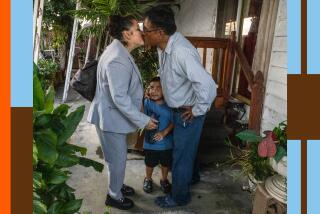Old Law Sets Family Adrift : Navy Husband’s Death Puts Mother of 2 in Deportation Bind
- Share via
One day after her daughter was born at Paradise Valley Hospital, Eleanor Palisoc, 27, received a telephone call informing her that her Navy husband, Daniel, had been killed in a traffic accident.
It was March 8, and Daniel, an 8-year Navy veteran, had left the couple’s Spring Valley home moments earlier to buy milk for newborn Audrey. Eleanor was alone with the baby and 4-year-old son Nathan when hospital officials called her with the bad news.
But, as great as her grief was, Palisoc, who is a native of the Philippines, said she was not prepared for the nightmare that has followed. Less than a month after her husband’s death she received a form letter from the district director of the Immigration and Naturalization Service that began abruptly:
“In accordance with a decision made in your case you are required to depart from the United States at your own expense on or before 9/24/89.”
Because she and her husband did not have immigration status, INS officials informed Palisoc that she would have to return to the Philippines with the couple’s two U.S.-born children.
“While my husband was alive, I could live and work here. . . . Now I feel like an illegal alien who has been caught,” said Palisoc, who has lived in San Diego more than five years. “I was hoping that they would let me stay because of my children and because of my husband’s years of service to this country. He planned to make the Navy his career.”
Future Is Uncertain
Palisoc’s plight has not gone unnoticed. Navy officials and a U.S. congressman have indicated that they will press attempts to allow her to remain in the United States. But, for now, her future in America is tenuous.
Palisoc and her husband came to the United States because of a little-known federal law that allows Filipino nationals to enlist in the U. S. Navy. Under that law, enacted after America colonized the Philippines in 1898, Filipinos are allowed to enlist in their homeland without first obtaining permanent resident status in the United States. Normally, aliens can enlist in the U. S. armed forces only after obtaining permanent resident status.
But, although other aliens can become naturalized after serving honorably for three years in the armed forces, under the almost century-old law Filipinos can become citizens only if the United States goes to war while they are on active duty.
In accordance with recent U.S.-Philippines treaty arrangements, the Navy now recruits about 400 Filipino sailors annually. But, since Congress declared the Vietnam War officially over on Oct. 15, 1978, no sailor has qualified for citizenship.
Between April, 1917, when the United States entered World War I, and the end of the Vietnam War, virtually every Filipino sailor--about 30,000 in all--who enlisted became U.S. citizens.
Daniel Palisoc, a college graduate and licensed engineer in the Philippines, was one of the lucky few allowed to enlist from the up to 24,000 applicants that the Navy tests annually in the island nation. He was an electrician’s mate.
Now, less than two months after Palisoc’s death, his widow said she is in the unenviable position of “having to make instant decisions,” like putting their home up for sale. The soft-spoken woman, who has a college degree in business administration, said she understands that the INS’ hands are tied in the matter.
“I knew about the law in this case. I know that Congress would have to change the law, or I would have to marry an American citizen to stay in this country . . . But how can I think of marriage at this time?” she said.
“I want to stay here because my children would have a better future,” she added. “Also, my husband is buried here. It’s really painful. When he was alive, we endured so many months of separation when he was at sea. Why do we have to be separated again?”
‘Tragic Set of Circumstances’
INS spokesman Rudy Murillo said that Palisoc has been given an opportunity to depart the country voluntarily. INS officials would be willing to extend her departure date if she needs more time to get her affairs in order, he added.
“Far and away, this is the most tragic set of circumstances I’ve been involved in. The district director has the authority to grant an indefinite extended voluntary departure and give an alien enough time to file for permanent residency. But that is used only in cases that fall through the cracks of the immigration statutes,” Murillo said.
“Unfortunately, in Mrs. Palisoc’s case the law is clear. Congress said that, if you’re the spouse of a Filipino enlistee, you have no equity if he dies,” Murillo said.
Palisoc said that another important factor in her desire to remain in the United States is her son’s asthma. The boy has been hospitalized for asthma attacks and is also required to take frequent shots for other allergic reactions.
“The medicines and quality of care that he is getting are not readily available in the Philippines,” Palisoc said.
Privately, INS officials say that they hope Palisoc finds a way to remain legally in the United States. “She’s articulate, college-educated and a good citizen who is working. She could be a real asset to this country,” said one official.
Navy officials have rallied to Palisoc’s side and written letters of support to the INS. Capt. John C. Ruff, who was Daniel Palisoc’s commanding officer on the USS Cape Cod, asked immigration officials to extend her departure date.
Capt. C. A. Hoyt, who is Palisoc’s supervisor at the Navy Resale & Services Support Office, where she works as an audit clerk, asked INS officials to consider her request for permanent residency.
“She is an extremely dependable employee, and the quality and quantity of her work are exceptional. . . . She is a great asset to this organization and her continued employment is certain,” wrote Hoyt.
Rep. Duncan Hunter (R-Coronado) asked INS Commissioner Alan Nelson to issue a waiver in Palisoc’s case. Hunter’s spokesman, Bob Medina, said that, if the INS does not issue a waiver, Hunter will introduce a bill to grant Palisoc citizenship.
More to Read
Sign up for Essential California
The most important California stories and recommendations in your inbox every morning.
You may occasionally receive promotional content from the Los Angeles Times.










